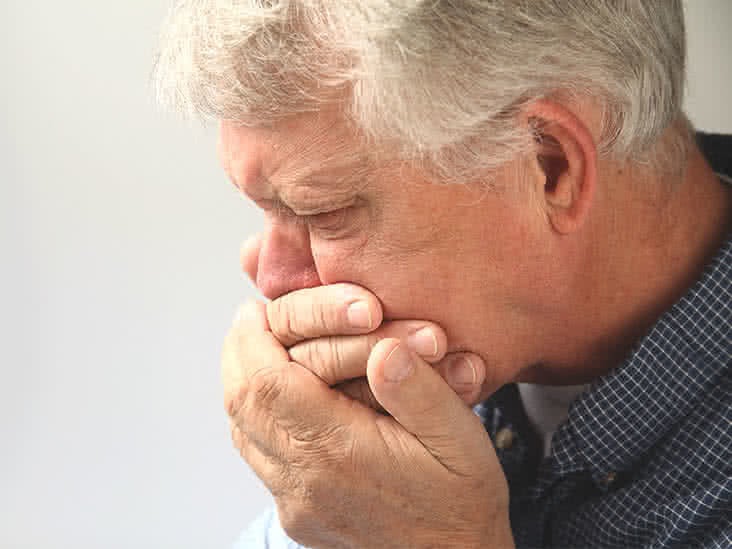Dry heaving, also known as retching, is the sensation of vomiting without actually expelling any contents from the stomach. It can be a distressing experience and may be accompanied by other symptoms such as nausea, dizziness, and sweating. While dry heaving can occur at any time of the day, some people may experience it more frequently in the morning. In this blog post, we will explore the causes of dry heaving and its occurrence in the morning.
There are several reasons why someone may experience dry heaving. Some of the common causes include:
1. Gastrointestinal Issues: Gastrointestinal issues such as acid reflux, irritable bowel syndrome (IBS), and gastroparesis (delayed stomach emptying) can cause dry heaving. These conditions can cause discomfort in the stomach and lead to the sensation of vomiting.
2. Dehydration: Dehydration can cause dry heaving, as the body may not have enouh fluids to produce vomit. This can occur due to not drinking enough water or excessive sweating.
3. Low Blood Sugar: When blood sugar levels drop, it can cause nausea and dry heaving. This is because the body needs glucose to function properly, and low levels can cause a range of symptoms.
4. Medications: Certain medications such as chemotherapy drugs, antibiotics, and antidepressants can cause dry heaving as a side effect.
5. Emotional Stress: Emotional stress and anxiety can cause dry heaving in some people. This is because stress can trigger the body’s fight or flight response, which can lead to physical symptoms such as nausea.
Dry Heaving in the Morning
While dry heaving can occur at any time of the day, some people may experience it more frequently in the morning. There are several reasons why this may occur:
1. Empty Stomach: When you wake up in the morning, your stomach may be empty, leading to the sensation of nausea and dry heaving. Eating a small snack such as crackers or toast can help alleviate this feeling.
2. Pregnancy: Morning sickness is a common symptom of pregnancy, and it can cause dry heaving in the morning. This is due to hormonal changes and increased sensitivity to smells and tastes.
3. Alcohol Consumption: Drinking alcohol before bed can lead to dehydration and cause dry heaving in the morning.
4. Anxiety: Some people may experience anxiety in the morning, leading to dry heaving. This can occur due to work-related stress or other personal issues.
5. Acid Reflux: Acid reflux is more common at night and can cause dry heaving in the morning. This is because stomach acid may travel up the esophagus while lying down, causing discomfort and nausea.
Dry heaving can be a distressing experience, but it is not always a cause for concern. If you experience dry heaving frequently or have other symptoms such as abdominal pain or diarrhea, it is important to see a healthcare provider. They can help diagnose any underlying conditions and provide treatment options to alleviate symptoms. In the meantime, staying hydrated, eating small meals throughout the day, and avoiding triggers such as alcohol and caffeine can help reduce the occurrence of dry heaving.
Stopping Dry Heaving in the Morning
Dry heaving in the morning can be an uncomfortable and unpleasant experience. Fortunately, there are several things you can do to help reduce or stop dry heaving in the morning.
Firstly, it may be helpful to have smaller meals more frequently throughout the day, rather than a few large meals. This can help to regulate your digestion and prevent your stomach from becoming too empty or too full.
Another strategy to reduce dry heaving in the morning is to eat a high-protein snack before bed. This can help to keep your blood sugar levels stable throughout the night, which can reduce the likelihood of waking up feeling nauseous.
Alternatively, you could try eating a few plain crackers (like saltines) first thing after waking up. This can help to settle your stomach and provide some relief from dry heaving.
It’s also important to stay hydrated throughout the day, as dehydration can sometimes contribute to dry heaving. Be sure to drink plenty of water and other fluids, especilly if you’ve been vomiting or experiencing diarrhea.
If dry heaving persists despite these strategies, it’s a good idea to consult with a healthcare provider. They can help to determine if there’s an underlying medical condition or medication that may be contributing to your symptoms, and provide appropriate treatment.

Causes of Morning Heaving
Heaving or feeling nauseous in the morning can have several causes. One of the most common reasons is low blood sugar levels. When you go without food for an extended period, such as during the night, your body’s glucose levels can drop, leading to feelings of nausea and dizziness. This can be especially true for people with diabetes, who may experience fluctuations in their blood sugar levels. Another possible cause of morning nausea is acid reflux or gastroesophageal reflux disease (GERD). This occurs when the stomach acid flows back into the esophagus, causing irritation and discomfort. Additionally, pregnancy and certain medications can also cause morning nausea. If you are experiencing persistent or severe morning nausea, it is advisable to consult with a healthcare professional to determine the underlying cause and receive appropriate treatment.
Causes of Morning Gagging and Vomiting
There are several reasons why you might be experiencing gagging and vomiting in the morning. One common cause is acid reflux or gastroesophageal reflux disease (GERD), which occurs when stomach acid flows back into the esophagus. This can cause irritation and inflammation, leading to nausea and vomiting.
Another possible cause is an empty stomach. When you haven’t eaten for several hours, your stomach can become irritated and cause nausea. Low blood sugar levels can also trigger nausea and vomiting, especially if you have diabetes or are on certain medications.
Dehydration can also cause morning nausea and vomiting. When you don’t drink enough water, your body can become dehydrated, which can lead to nausea, dizziness, and other symptoms.
In some cases, morning nausea and vomiting can be a symptom of a more serious condition, such as an infection, migraine, or kidney problems. If you experience these symptoms regularly, it’s important to speak with your healthcare provider to determine the underlying cause and receive approriate treatment.
Why Do I Feel Nauseous in the Morning But Nothing Comes Out?
If you feel like vomiting in the morning but nothing comes out, it could be caused by a few different factors. One possibility is that you are experiencing acid reflux or GERD. This occurs when stomach acid flows back up into the esophagus, causing irritation and a feeling of nausea. This can be worsened by lying down, which is why it may be more noticeable in the morning.
Another possible cause is anxiety or stress. These emotions can trigger the body’s “fight or flight” response, which can lead to nausea and oher digestive symptoms. This can be especially common in the morning, when you may be anticipating a stressful day ahead.
Pregnancy can also be a cause of morning nausea, even if you are not actually vomiting. This is known as morning sickness and is caused by hormonal changes in the body.
Lastly, it’s possible that you are experiencing dry heaving, which can create vomiting-like sensations but without anything actually coming up. This can be caused by a combination of diaphragm contractions and a closed-off airway, and can be a symptom of various conditions or behaviors.
If you are experiencing persistent nausea or other symptoms, it’s important to talk to your healthcare provider to determine the underlying cause and receive appropriate treatment.
The Causes of Morning Nausea
There could be several reasons why you feel like you’re going to throw up every morning. One possibility is that you may be experiencing morning sickness, whih is a common symptom of pregnancy. Another possibility is that you may have an underlying medical condition such as acid reflux, gastritis, or irritable bowel syndrome.
Alternatively, it could be due to hunger or low blood sugar levels. If you haven’t eaten for a long time, such as if you skipped dinner the previous night or if you have a fast metabolism, your blood sugar levels can drop, causing you to feel dizzy, weak, or nauseous.
It’s also possible that your morning nausea could be due to anxiety or stress. Anxiety can trigger the release of stress hormones, which can cause gastrointestinal symptoms such as nausea and vomiting.
If you’re concerned about your morning nausea, it’s important to speak with your healthcare provider to determine the underlying cause and get appropriate treatment. They may suggest changes to your diet or lifestyle, medication, or other interventions to help alleviate your symptoms.

Causes of Uncontrollable Dry Heaving
Uncontrollable dry heaving, also known as intractable retching, can be caused by several factors. One of the most common causes is gastrointestinal issues such as gastroesophageal reflux disease (GERD), irritable bowel syndrome (IBS), or gastroparesis. In some cases, certain medications, such as chemotherapy drugs or opioids, can case dry heaving as a side effect of withdrawal. Additionally, excessive alcohol consumption or drug abuse can also lead to dry heaving. Other potential causes include motion sickness, anxiety, or exposure to unpleasant odors or sights. It’s important to seek medical attention if dry heaving persists or is accompanied by other symptoms such as dehydration, abdominal pain, or fever.
Treating Dry Heaves
Dry heaves, also known as retching, can be an unpleasant and uncomfortable experience. Fortunately, there are a few things that you can take to help alleviate the symptoms. The first step is to sit down, be still, and take deep, measured breaths. This can help to calm your body and reduce the feelings of nausea.
It’s also important to stay hydrated by sipping water. Dehydration can worsen dry heaves and make you feel even more unwell. If you’re struggling to keep water down, try sucking on ice chips or drinking clear fluids like broth or apple juice.
Eating small, frequent meals throughout the day can also help to ease the symptoms. Aim for easy-to-digest foods like saltines, dry toast, or plain rice. Avoid fatty, spicy, or acidic foods, which can irritate your stomach and make things worse.
You may also want to try over-the-counter medications like Pepto-Bismol or Tums. These can help to calm your stomach and reduce nausea. If your dry heaves are caused by anxiety or stress, you may benefit from talking to a therapist or trying relaxation techniques like deep breathing or meditation.
The key to managing dry heaves is to take it easy, stay hydrated, and eat small, easy-to-digest meals. If your symptoms persist or worsen, it’s important to talk to your doctor to rule out any underlying medical conditions.
Duration of Dry Heaving
Dry heaving, which is the act of retching or attempting to vomit without any contents in the stomach, can last for diffeent durations depending on the underlying cause. In most cases, dry heaving stops within 6-24 hours, especially if it is caused by a short-term condition such as overeating or alcohol consumption.
However, if dry heaving is due to a more severe condition such as gastroenteritis, food poisoning, or a viral infection, it may last for several days or even weeks. In such cases, medical attention may be required to manage the underlying illness and relieve the symptoms of dry heaving.
It is also worth noting that some people may experience recurring episodes of dry heaving, especially if it is caused by a chronic condition such as acid reflux or irritable bowel syndrome. If this is the case, it is important to seek medical advice to determine the underlying cause and receive appropriate treatment.
The Effects of Anxiety on Dry Heaving
Anxiety can cause dry heaving. When you experience anxiety, your body enters into a state of heightened alertness and stress. This can trigger the release of stress hormones such as adrenaline and cortisol, which can lead to physical symptoms such as nausea, stomach upset, and dry heaving. In some cases, anxiety-related nausea can be so severe that it leads to vomiting. The severity of symptoms can vary depending on the individual and the level of anxiety they are experiencing. It’s important to note that if you are experiencing frequent episodes of dry heaving or oher symptoms related to anxiety, it’s important to seek professional help from a healthcare provider or mental health professional. They can work with you to develop a treatment plan to manage your anxiety and improve your overall well-being.

Conclusion
Dry heaving is a common experience that can be caused by a variety of factors, including nausea, anxiety, dehydration, and low blood sugar levels. The sensation of dry heaving is similar to vomiting, but no actual vomit is expelled. While it is often harmless, chronic or severe dry heaving may indicate an underlying medical condition that requires treatment. It is essential to identify the underlying cuse of dry heaving and seek appropriate medical attention if necessary. Maintaining proper hydration, eating regular meals, and managing stress levels can help reduce the frequency and severity of dry heaving. With proper care and attention, most people can manage and overcome this uncomfortable experience.
